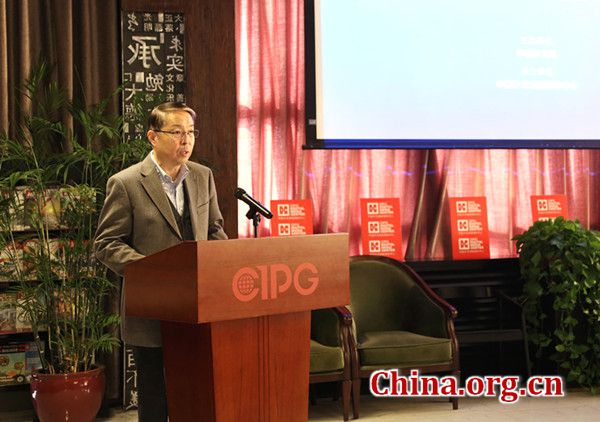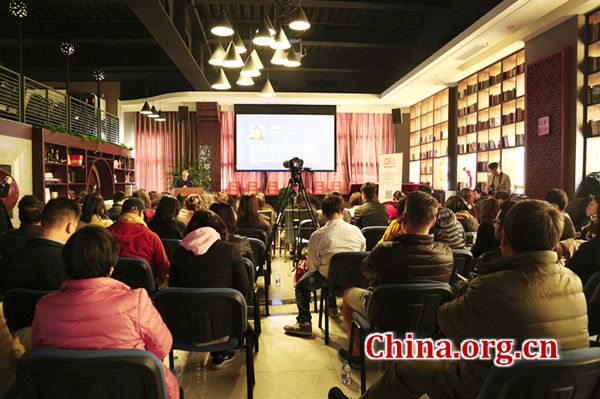Seminar discusses new direction for China-US relations
- By Zhang Rui
 0 Comment(s)
0 Comment(s) Print
Print E-mail China.org.cn, November 8, 2017
E-mail China.org.cn, November 8, 2017
 |
|
Fang Zhenghui, vice president of China International Publishing Group (CIPG), delivers a speech at a seminar held in Beijing, Nov. 7, 2017. [Photo/China.org.cn] |
A seminar organized by China International Publishing Group (CIPG) was held in Beijing before U.S. President Donald Trump's state visit to China, with experts examining the desired new direction for bilateral relations.
The seminar, with a theme of "New Era - A New Direction For China-U.S. Relations," explored topics related to the impact the Chinese and American presidents meeting would have on China-U.S. relations, as well as the wider Asia-Pacific region and even the world.
Fang Zhenghui, vice president of CIPG, delivered a speech in which he said Trump's visit marked realization of the "back and forth" interaction between the two heads of state, with a new cycle officially begun for China-U.S. relations.
Lyu Xiang, an expert focusing on American issues and world politics from the Chinese Academy of Social Sciences, said that there had been a certain degree of "isolationism" in the U.S. from the country’s very foundation.
However, this "isolationism" didn't necessarily mean something totally negative. In some senses, this was even the reason why the U.S. could become so strong.
Yet, it could not be overlooked that the Trump administration currently had a tendency toward neo-isolationism, meaning reduction in its management of global affairs and clear doubts about the multilateral system. Realizing this would help China understand Trump's governing principles and measures more clearly, Lyu said.
Li Yong, director of the China-US-EU Research Center of China Association of International Trade, said the bilateral economic and trade relations were closely linked and that the two economies had formed a major foundation for advance of the world economy. China-U.S. relations, good or bad, would have a profound impact on the global economy.
Zhao Kejin, associate dean and professor at Tsinghua University's School of Social Sciences, said that, at the recently concluded 19th CPC National Congress, Chinamade its judgment for a new era. At the same time, the world had also entered a new era in which China was proposing initiatives and plans to promote the building of a community of shared human destiny in the context of very complicated global issues.
 |
|
Experts discuss the new direction for China-US relations at a seminar held in Beijing, Nov. 7, 2017. [Photo/China.org.cn] |
The economic and trade relations between China and the U.S. that had previously assumed the role of "ballast" were now frequently subject to frictions, and, "we must take precautions and propose solutions as soon as possible."
Jake Parker, vice president of the US China Business Council, said China-U.S. economic and trade cooperation had always been the most talked-about topic. China was pushing economic reform onto a higher speed track, hoping that the two countries would enjoy a fairer environment for business cooperation, instead of undermining the interests of the enterprises of either country.
The experts attending the seminar also agreed unanimously that the North Korean issue was the most important topic apart from economy and trade.
Huo Jianguo, vice chairman of China Society for WTO Studies, said in a speech later that cooperation among big powers was of crucial importance to global governance. Undeniably, there were still some conflicts and differences between China and the U.S., which would take a long time to resolve.
Strengthening communications was an effective way to solve the problem. In addition, the two countries should constantly seek more cooperation areas besides trade.






Go to Forum >>0 Comment(s)